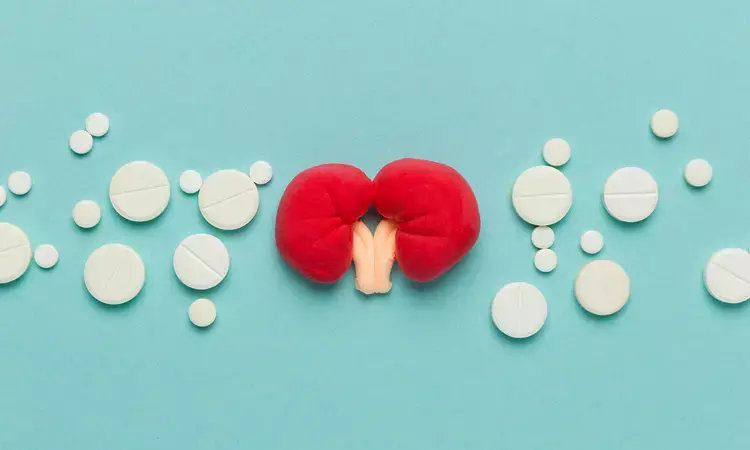- Home
- Medical news & Guidelines
- Anesthesiology
- Cardiology and CTVS
- Critical Care
- Dentistry
- Dermatology
- Diabetes and Endocrinology
- ENT
- Gastroenterology
- Medicine
- Nephrology
- Neurology
- Obstretics-Gynaecology
- Oncology
- Ophthalmology
- Orthopaedics
- Pediatrics-Neonatology
- Psychiatry
- Pulmonology
- Radiology
- Surgery
- Urology
- Laboratory Medicine
- Diet
- Nursing
- Paramedical
- Physiotherapy
- Health news
- Fact Check
- Bone Health Fact Check
- Brain Health Fact Check
- Cancer Related Fact Check
- Child Care Fact Check
- Dental and oral health fact check
- Diabetes and metabolic health fact check
- Diet and Nutrition Fact Check
- Eye and ENT Care Fact Check
- Fitness fact check
- Gut health fact check
- Heart health fact check
- Kidney health fact check
- Medical education fact check
- Men's health fact check
- Respiratory fact check
- Skin and hair care fact check
- Vaccine and Immunization fact check
- Women's health fact check
- AYUSH
- State News
- Andaman and Nicobar Islands
- Andhra Pradesh
- Arunachal Pradesh
- Assam
- Bihar
- Chandigarh
- Chattisgarh
- Dadra and Nagar Haveli
- Daman and Diu
- Delhi
- Goa
- Gujarat
- Haryana
- Himachal Pradesh
- Jammu & Kashmir
- Jharkhand
- Karnataka
- Kerala
- Ladakh
- Lakshadweep
- Madhya Pradesh
- Maharashtra
- Manipur
- Meghalaya
- Mizoram
- Nagaland
- Odisha
- Puducherry
- Punjab
- Rajasthan
- Sikkim
- Tamil Nadu
- Telangana
- Tripura
- Uttar Pradesh
- Uttrakhand
- West Bengal
- Medical Education
- Industry
Lithium use - A Friend or Foe to kidney health ?

Lithium remains the most efficacious therapy for a significant proportion of patients with type 1 bipolar disorder. Despite the therapeutic advantages, the use of lithium has been decreasing at least in part because of the perceived risks surrounding its use, including the potential for nephrotoxicity with long term use.
In a recent study, researchers have reported that lithium use does not have a direct impact on the incidence of AKI. However, they noted that lithium intoxication, duration of exposure and lithium levels in the blood might increase the risk of AKI.
The study findings were presented at the Virtual meeting of the American Society of Nephrology on November 04, 2021.
A pre-clinical study has shown that lithium has a protective action against tubular injury in experimental AKI models. However, previous clinical studies have demonstrated the association between lithium and acute kidney injury (AKI) at toxic blood levels but the risk of AKI has otherwise not been well studied. Therefore, Dr Gisli Gislason and his team conducted a study to examine the risk of AKI in individuals treated with lithium.
In this retrospective cohort study, the researchers included 2310 patients who were treated with lithium in Iceland between 2003–2018. They were compared with a control group patients with affective disorders (ICD 10 codes F30-F39) attending the outpatient clinic of the Mental Health Services at Landspitali–the National University Hospital in 2014–2016, who had never used lithium. The researchers obtained clinical and laboratory data, including ICD-9 and ICD-10 codes and serum creatinine (SCr) values from nationwide electronic medical records. They determined AKI using the SCr component of the KDIGO criteria and used multivariable logistic regression for the analysis.
Key findings of the study:
- Among 2310 patients in the lithium group, the researchers noted that 297 developed AKI.
- Among 1426 individuals in the control group, 1218 (85.5%) were included and, 97 (8.0%) developed AKI.
- Upon analysis, the researchers noted that lithium use was not an independent risk factor for AKI (OR 0.93).
- When lithium users were analyzed separately, they found that the lithium intoxication (OR 2.34), duration of lithium therapy (OR 1.01) and mean lithium concentration (OR 1.22) were all significant risk factors for the development of AKI.
The authors concluded, "Our findings suggest that lithium use does not affect the incidence of AKI after controlling for important covariates. However, lithium intoxication, time on lithium therapy and blood lithium concentration are associated with increased risk of AKI."
For further information: Gisli Gislason et al., Incidence of AKI in Individuals Treated with Lithium, American Society of Nephrology, Abstract: PO0188.
Medical Dialogues Bureau consists of a team of passionate medical/scientific writers, led by doctors and healthcare researchers. Our team efforts to bring you updated and timely news about the important happenings of the medical and healthcare sector. Our editorial team can be reached at editorial@medicaldialogues.in.
Dr Kamal Kant Kohli-MBBS, DTCD- a chest specialist with more than 30 years of practice and a flair for writing clinical articles, Dr Kamal Kant Kohli joined Medical Dialogues as a Chief Editor of Medical News. Besides writing articles, as an editor, he proofreads and verifies all the medical content published on Medical Dialogues including those coming from journals, studies,medical conferences,guidelines etc. Email: drkohli@medicaldialogues.in. Contact no. 011-43720751


